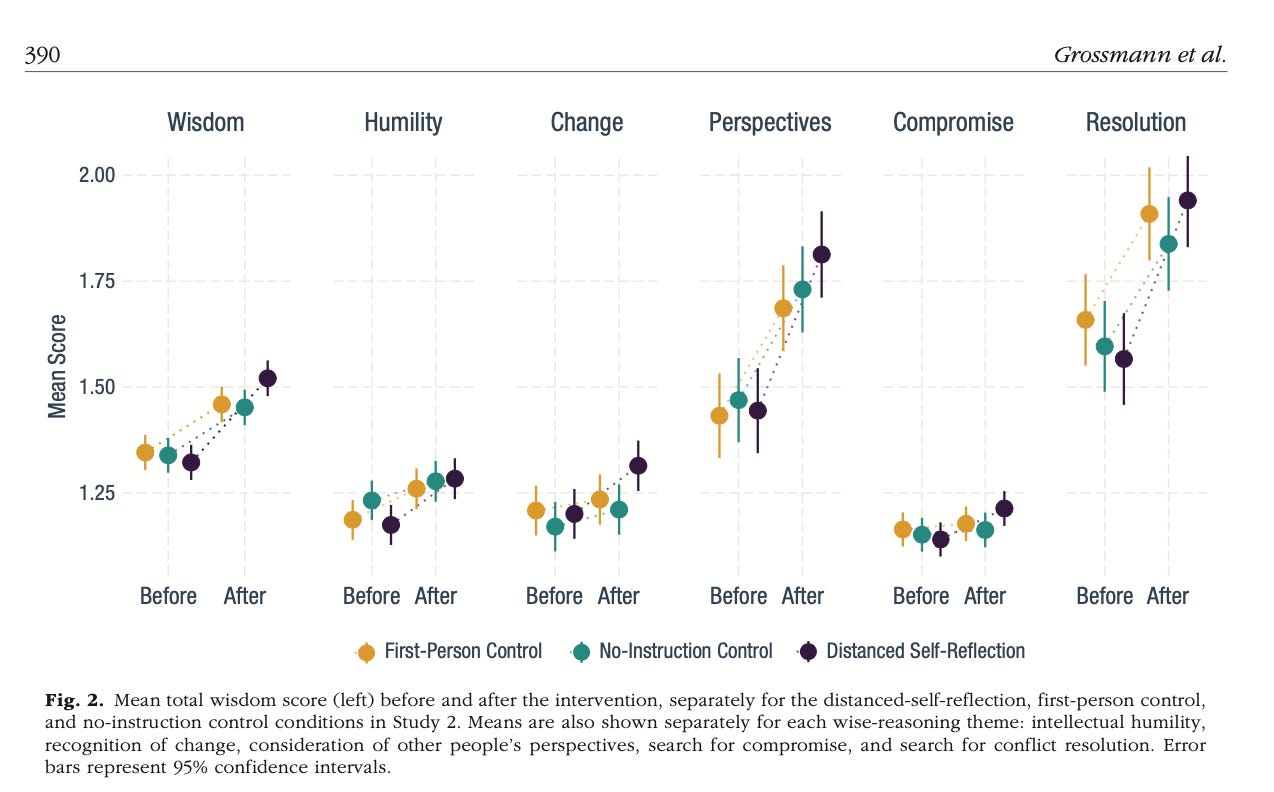Journaling is, on its surface, pretty easy: Get a notebook. Get a pen. Write about your life. Done.
But not all journaling is created equal. One of the most powerful journaling techniques is simply talking to yourself the right way — like a philosopher.
What does a person gain from practicing philosophy? Antisthenes, one of Socrates’s students, had a strange answer to this question. He said he gained, “The ability to converse,” with himself1.
Why would we want to talk to ourselves? Isn’t that the domain of crazy people and eccentric cranks?
Talking to ourselves, particularly through a certain kind of journaling, can make us wiser, calmer, more at peace with our lives, and better at conflict navigation — exactly what philosophers try to achieve.
That’s not only my conclusion from journaling this way for many years, but that of a lot of psychological research.
Illeism and Perspective
The kind of journaling that stands out is ‘Illeism’, which simply means that you’re taking on the detached perspective of an outsider and referring to yourself with second or third-person pronouns.
So I’d write ‘Andrew ate dinner”, or — my personal preference — “you ate dinner”, instead of “I ate dinner.”
That sounds like a minor change, but it creates enough distance between us and our egos that we can assess situations more objectively and look at our emotions rationally rather than letting them cloud our thinking.
This technique isn’t new. In fact, some of the wisest men and women in history have used it gain perspective on their lives.
Marcus Aurelius’s Journal
Perhaps the best surviving example of ancient illeism is “Meditations,” the journal of the Roman Emperor and philosopher Marcus Aurelius.
If you read the book, you’ll notice that he uses the second-person pronouns “you” and “your” most frequently.
“…it is not the thing itself that troubles you,” he writes, “but your own judgement about it. And this you have the power to eliminate.” (Meditations 8.47)
And “The things you think about determine the quality of your mind. Your soul takes on the color of your thoughts.” (Meditations 5.16)
And on another occasion, “Just that you do the right thing. The rest doesn’t matter.” (Meditations 6.2)
Clearer Thinking Through Illeism
Modern researchers have found that Marcus’s way of journaling changes how we think.
In this study of the “Distanced-Self-Reflection Diary Method,” researchers asked 555 participants to reflect on their daily struggles in a month-long diary. Half were told to use the third person, which the researchers called distanced self-reflection. The other half wrote in the first person. In a second study, participants were given no specific instructions about how to write, and served as a kind of control for the other two.
All the assessed forms of wise reasoning, such as intellectual humility, open-mindedness about how situations can unfold, and consideration for diverse viewpoints were improved among all the participants who journaled. But they improved most in the third-person group.
“Utilizing the ancient practice of distanced self-reflection, we demonstrated that referring to oneself in the third person during repeated reflections on daily events affords a more expansive self-focus, which in turn facilitates wiser reasoning,” the researchers wrote. “The results from two field studies suggest that training people in distanced self-reflection can bolster wise reasoning in everyday life.”
Several dozen other studies have found similar improvements to a wide range of psychological issues when switching to the second or third person, including social anxiety and post-event worry,
So simply writing about your life and stressful events in the second or third person is likely to make you psychologically healthier, but there’s a way we can take this a step further.
What Would Rusticus Do?
We might ask why Marcus journaled in the second person to begin with. Yes, it was a longstanding philosophical tradition.
But in, “How to Think Like a Roman Emperor,” author Donald Robertson suggests “Meditations” may have started as an attempt by Marcus to replace the counsel of his philosophy teacher, Junicus Rusticus, who’d recently died.
Well into adulthood, Marcus relied on Rusticus’s perspective. He’d tell his old mentor what he was struggling with, and Rusticus replied with sound advice grounded in philosophy.
When Rusticus’s died, Marcus needed to become his own teacher. He already knew the precepts of Stoic philosophy, but externalizing that knowledge and passing it back to himself as though through another person made a big difference.
If you study a religion or philosophy, or simply have someone you look up to and admire, you can start any journaling session by asking yourself what advice or perspective your exemplar would give you. You likely already know what their more expansive view entails, so pass the advice back to your conscious mind to help clear the fog.
If you’re looking for powerful topics to use this technique with, death and fate are two good options.
Until next time, keep journaling.
(Lives of the Eminent Philosophers, Diogenes Laertius)






Looks like it's worth trying
Enjoyed this. I have a section on my substack called In Second Person and this gave me a new way to look at it